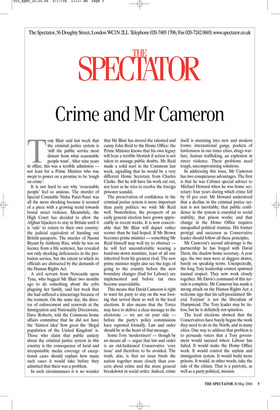Crime and Mr Cameron
Tony Blair said last week that the criminal justice system is ‘still the public service most distant from what reasonable people want’. After nine years in office, this was a terrible admission not least for a Prime Minister who was swept to power on a promise to be ‘tough on crime’.
It is not hard to see why ‘reasonable people’ feel so anxious. The murder of Special Constable Nisha Patel-Nasri was all the more shocking because it seemed of a piece with a growing trend towards brutal street violence. Meanwhile, the High Court has decided to allow the Afghan hijackers to stay in Britain until it is ‘safe’ to return to their own country: the judicial equivalent of handing out British passports. The murder of Naomi Bryant by Anthony Rice, while he was on licence from a life sentence, has revealed not only shocking deficiencies in the probation service, but the extent to which its officials are distracted by the demands of the Human Rights Act.
A civil servant from Newcastle upon Tyne, who begged Mr Blair two months ago to do something about the yobs plaguing her family, said last week that she had suffered a miscarriage because of the torment. On the same day, the director of enforcement and removals at the Immigration and Nationality Directorate, Dave Roberts, told the Commons home affairs committee that he did not have the ‘faintest idea’ how great the ‘illegal population of the United Kingdom’ is. Those who claim that public anxiety about the criminal justice system in this country is the consequence of lurid and irresponsible media coverage of exceptional cases should explain how many such cases it would take before they admitted that there was a problem.
In such circumstances it is no wonder that Mr Blair has moved the talented and canny John Reid to the Home Office: the Prime Minister knows that his own legacy will bear a terrible blemish if action is not taken to assuage public doubts. Mr Reid made a solid start in the Commons last week, signalling that he would be a very different Home Secretary from Charles Clarke. But he will have his work cut out, not least as he tries to resolve the foreign prisoner scandal.
The preservation of confidence in the criminal justice system is more important than party politics: we wish Mr Reid well. Nonetheless, the prospects of an early general election have grown appreciably in recent weeks. It is now conceivable that Mr Blair will depart rather sooner than he had hoped. If Mr Brown becomes prime minister — something Mr Reid himself may well try to obstruct he will feel uncomfortable wearing a hand-me-down mandate, least of all one inherited from his greatest rival. The new prime minister might also see the logic of going to the country before the new boundary changes (bad for Labour) are implemented and before tax rises become unavoidable.
This means that David Cameron is right to warn his party to stay on the war footing that served them so well in the local elections. It also means that the Tories may have to deliver a clear message to the electorate — we are on your side before the party’s policy commissions have reported formally. Law and order should be at the heart of that message.
Some Tory ‘modernisers’ — though by no means all — argue that law and order is an old-fashioned Conservative ‘core issue’ and therefore to be avoided. The truth, alas, is that no issue binds the nation together more closely than concern about crime and the more general breakdown in social order. Indeed, crime itself is mutating into new and modern forms: international gangs, pockets of lawlessness in our inner cities, drugs warfare, human trafficking, an explosion in street violence. These problems need tough, uncompromising solutions.
In addressing this issue, Mr Cameron has two conspicuous advantages. The first is that he was Cabinet special adviser to Michael Howard when he was home secretary: four years during which crime fell by 18 per cent. Mr Howard understood that a decline in the criminal justice system is not inevitable; that public confidence in the system is essential to social stability; that prison works; and that change in the Home Office requires unequalled political stamina. His former protégé and successor as Conservative leader should follow all these principles.
Mr Cameron’s second advantage is the partnership he has forged with David Davis, the shadow home secretary. A year ago, the two men were at daggers drawn, barely on speaking terms. Unexpectedly, the long Tory leadership contest spawned mutual respect. They now work closely together. Mr Davis’s command of this terrain is complete. Mr Cameron has made a strong attack on the Human Rights Act: a welcome sign that his self-proclaimed ‘liberal Toryism’ is not the liberalism of Hampstead. The Tory leader may be tieless, but he is definitely not spineless.
The local elections showed that the Conservatives have barely begun the work they need to do in the North, and in many cities. One way to address that problem is to persuade voters that a Tory government would succeed where Labour has failed. It would make the Home Office work. It would control the asylum and immigration system. It would build more prisons. It would, in other words, take the side of the citizen. That is a patriotic, as well as a party political, mission.


















































































 Previous page
Previous page